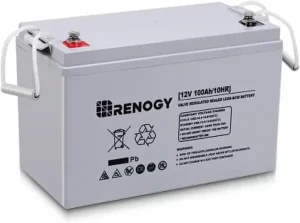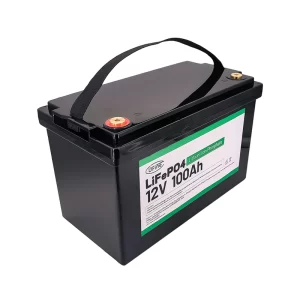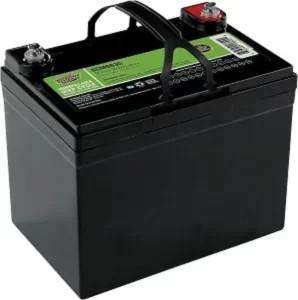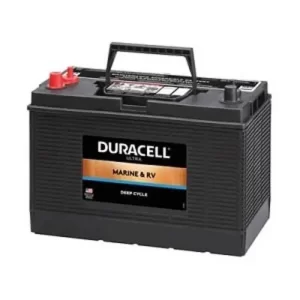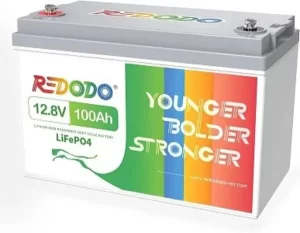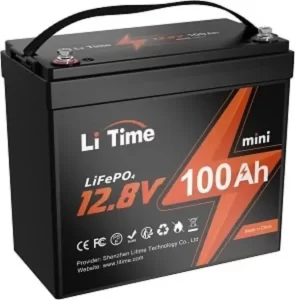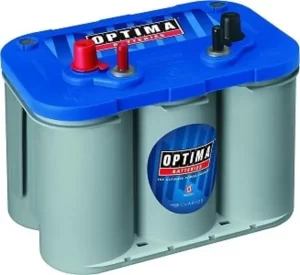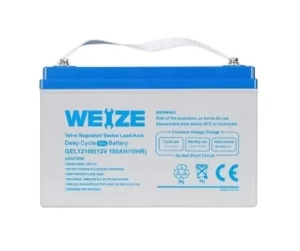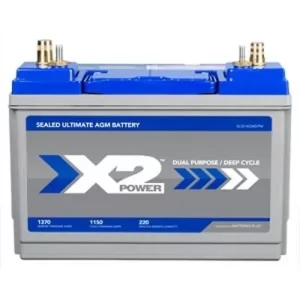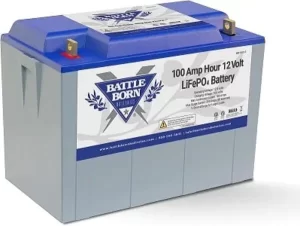Are you struggling to find the perfect lithium battery for your RV? This guide simplifies your search! Learn why lithium batteries are superior, their unique benefits, and how they transform your RVing experience. Let’s explore the details!
We know finding the best lithium battery for RV is challenging! Even though there are many battery options for RVs, lithium batteries in RVs are highly popular. It is considered one of users’ most versatile and highly sustainable options.
Also, they are quick and efficient as they have a high charge and discharge rate and are widely used for many applications. Since fast charging helps to minimize downtime, it is one of the most preferred choices for users.
In this guide, you will find the key advantages of using lithium batteries for RV applications, the best list of 10 lithium batteries, and the key factors to consider when you buy one! Let’s get down in detail.
Part 1. Why choose lithium batteries for RVs? Advantages explained!
The following are the key advantages of using lithium batteries over traditional battery options:
- Consist of higher energy density than conventional options
- Lithium batteries have a longer lifespan and store more charge
- Lithium batteries have a quick charging capability
- It has a lower self-discharge rate and can hold its charge for more extended periods in instances when it is not used
- Lithium batteries are more environmentally friendly as they can be recycled easily.
Part 2. Top 10 lithium batteries for RV owners: ranked & reviewed
1. Renogy Deep Cycle AGM Battery 12 Volt 100Ah
Key specifications:
- Voltage: 12 V
- Ampere Hours: 100 Ah
- Dimensions (L x W x H): 13.1 x 6.9 x 8.6 in.
Pros:
- Ability to maintain power longer even with a low 3% self-discharge rate
- Capable of maintaining a stable discharge rate in cold temperatures down to 5°F (-15°C)
- Provides durability and resistance to vibrations and bumps
- It has a high capacity of 100Ah capacity
Cons:
- Lead acid batteries are heavier than lithium options
- Consists of a limited number of charge-discharge cycles
2. Ufine 12 V 100Ah LiFePO4 Battery 185215340
Key specifications:
- Voltage: 12 V
- Capacity: 100 Ah
- Chemistry: Lithium Iron Phosphate (LiFePO4)
- Maximum Discharge Rate: 5.0C
Pros:
- Has fewer combustion risks
- Consists of multiple charge cycles
- Highly durable
- It has a consistent voltage output
Cons:
- It has a high upfront cost
3. Interstate Batteries AGM Deep Cycle Battery
Key specifications:
- Voltage: 12 V
- Ampere Hours: 35 Ah
- Dimensions (L x W x H): 7.68 x 5.16 x 6.42 in.
Pros:
- Absorbed Glass Mat (AGM) helps to prevent spills
- Only 22.9 pounds and lighter in weight
- Consists of reliable performance even in cold winter months
- Improved resistance to vibrations
Cons:
- It has only a 35 Ah capacity
- May have a shorter lifespan
4. Duracell Ultra Flooded Deep Cycle Marine & RV Battery
Key specifications:
- Voltage: 12 V
- Ampere Hours: 105 Ah
- Dimensions (L x W x H): 13 x 6.75 x 9.5 in.
Pros:
- Resist 105 amp hours of capacity
- Suitable for marine purposes.
- Ability to handle discharges and recharges
- Has a balanced performance and cost
Cons:
- Require high maintenance
- Heavier than lithium options.
5. Redodo 12 Volt 100Ah LiFePO4 Lithium Battery
Key specifications:
- Voltage: 12 V
- Ampere Hours: 100 Ah
- Dimensions (L x W x H): 13 x 6.77 x 8.43.
Pros:
- Recyclable anywhere from 4,000 to 15,000 times
- It has a longer lifespan of 10 years
- Has reliable performance
- It consists of five years of warranty
Cons:
- Has compatibility issues.
6. Litime 12 Volt 100Ah Mini LiFePO4 Lithium Battery
Key specifications:
- Voltage: 12.8 V
- Ampere Hours: 100 Ah
- Dimensions (L x W x H): 10.23 x 5.23 x 8.95 in.
Pros:
- Ideal for small campers and RVs
- It weighs only 19 pounds
- Provides ample power with 12.8 voltage and 100 amp hours
- Highly durable and IP65 waterproof
Cons:
- May consist of compatibility concerns
7. Optima Batteries D34M BlueTop Starting and Deep Cycle Marine Battery
Key specifications:
- Voltage: 12 V
- Ampere Hours: 55 Ah
- Dimensions (L x W x H): 10 x 6-7/8 x 7-13/16 in.
Pros:
- It can be used as a starting battery and as a deep-cycle Battery
- Has high 750 cold-cranking amps.
- It has an extended reserve capacity of 120 minutes
- Ability to quickly recharge
Cons:
- Has fewer ampere hours of 55 Ah
8. WEIZE 12 Volt 100Ah Deep Cycle Gel Battery
Key specifications:
- Voltage: 12 V
- Ampere Hours: 100 Ah
- Dimensions (L x W x H): 12.8 x 6.8 x 8.5 in.
Pros:
- Offer high safety
- Has valve-regulated design
- It consists of 15 years of service life.
- Suitable for many applications such as RVs, marine use, solar power systems, and electric wheelchairs.
Cons:
- Gel cell batteries are typically heavier
- Sensitive to overcharging
9. X2Power AGM Deep Cycle Marine & RV Battery
Key specifications:
- Voltage: 12 V
- Ampere Hours: 100 Ah
- Dimensions (L x W x H): 12.91 x 6.77 x 9.25 in.
Pros:
- Provides high performance of 1,150 CCA (Cold Cranking Amps).
- It has 220 minutes of reserve capacity
- Requires minimal maintenance
- Spill-proof and gas-free
Cons:
- Heavier in weight
- It has a limited temperature range
10. Battle Born Batteries LiFePO4 Deep Cycle Battery
Key specifications:
- Voltage: 12 V
- Ampere Hours: 100 Ah
- Dimensions (L x W x H): 12.75 x 6.88 x 9 in.
Pros:
- Ability to handle 3,000 to 5,000 cycles of deep discharging
- Has 10 to 15 years of service life
- The BMS protects against extreme temperatures
- Require less maintenance
Cons:
- Consist compatibility concerns
- Sensitive to overcharging
Part 3. Factors to consider before choosing a lithium battery for an RV
The following are the key factors to consider before choosing a lithium battery for an RV:
- Check the battery size: Verify the essential load power, running hours, battery storage, and installation space to determine the Battery’s proper size.
- Maintenance: Ensure the Battery has less maintenance and a longer life span depending on the DOD (depth of discharge).
- Environmentally friendly: Lithium batteries are environmentally friendly and have zero pollution.
- Cost: Ensure the cost meets your budget and is reasonable based on the lithium battery specification.
Common Misconceptions About Lithium Batteries for RVs
Many RV owners hesitate to switch to lithium batteries due to misconceptions. Here are some facts:
- Misconception: Lithium batteries are too expensive.
Truth: While the upfront cost is higher, the long-term savings in maintenance and longevity often outweigh the initial expense.
- Misconception: All lithium batteries are the same.
Truth: Different types like LiFePO4 offer unique advantages, such as better safety and lifespan.
Part 4. Final Thoughts
In conclusion, we have made finding the best lithium battery for your RV easy! Based on our guide of 10 best lithium batteries, you can effectively see the best choice based on its specifications and your requirements.
Alongside this, pay attention to the critical factors of lithium battery specifications when buying the right one.
Part 5. FAQs
-
What is the best battery for RV use?
The best Battery for RV use is 12 V 100Ah LiFePO4 Battery 1852153,40, which has a voltage of 12 Va, a capacity of 100 Ah, and a maximum discharge rate of 5.0C. -
What are the most reliable lithium batteries?
The most reliable lithium batteries are 12 V 100Ah LiFePO4 Battery 185215340, Optima Batteries D34M BlueTop Starting and Deep Cycle Marine Battery, WEIZE 12 Volt 100Ah Deep Cycle Gel Battery, Redodo 12 Volt 100Ah LiFePO4 Lithium Battery, Duracell Ultra Flooded Deep Cycle Marine & RV Battery, and Interstate Batteries AGM Deep Cycle Battery. -
Which type of lithium battery is best?
The best type of lithium battery is the LFP battery, which is the safest option as it doesn’t harm battery performance even when fully charged. -
What is the best RV lithium battery in terms of value?
The Ufine 12 V 100Ah LiFePO4 Battery offers the best balance between performance, safety, and cost. -
How do I choose the right lithium battery?
Look at size, capacity, and budget. LiFePO4 batteries are excellent for durability and safety. -
Which is better, LiFePO4 vs lithium-ion battery?
We are choosing whether LiFePO4 vs lithium-ion battery depends on your requirements. However, LiFePO4 has a longer lifespan than lithium-ion and is considered more stable. But, lithium-ion comparatively requires less maintenance and is regarded as a cheaper alternative.
Related Tags:
More Articles
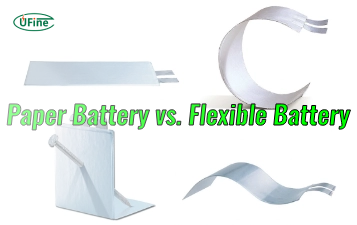
Paper Battery vs. Flexible Battery: What’s the Difference and Which Is Better?
Paper vs. flexible batteries: learn the key differences, benefits, and which power source fits best for wearables, sensors, and smart tech.
What to Know Before Buying a Tiny LiPo Battery for Your Project
Tiny LiPo batteries are powerful and compact. Learn how to choose the right one for your project with specs, safety, and charging tips.
Bloated LiPo Battery: Will It Explode?
Will a bloated LiPo battery explode? Discover the causes, risks, safety steps, and expert tips to avoid disaster and protect your gear. Must-read safety guide!
12V 100Ah Lithium Ion Battery Price: Full Guide
Learn about 12V 100Ah lithium-ion battery price, from cost ranges to best brands, hidden fees, and how to get the best deal. A must-read for smart buyers!
Resistance and Conductivity: What It Means for Your Lithium Batteries
Resistance and conductivity impact lithium battery performance, lifespan, and safety—learn how they work and why they matter.
